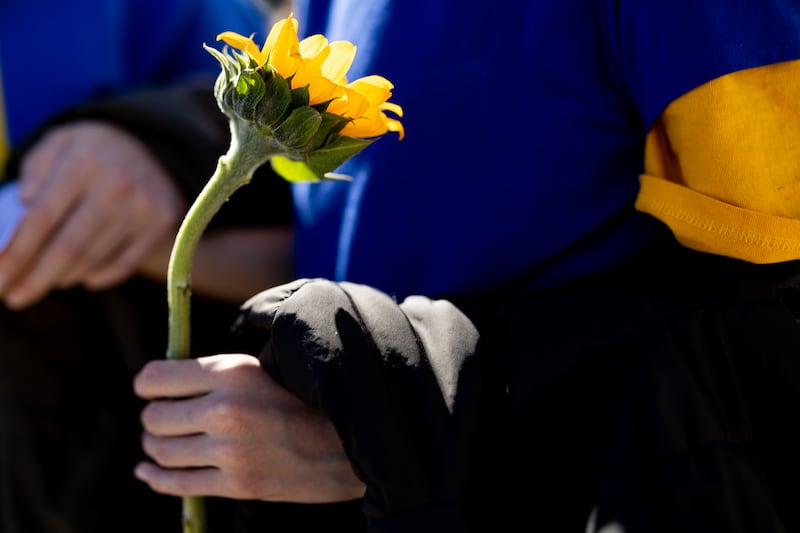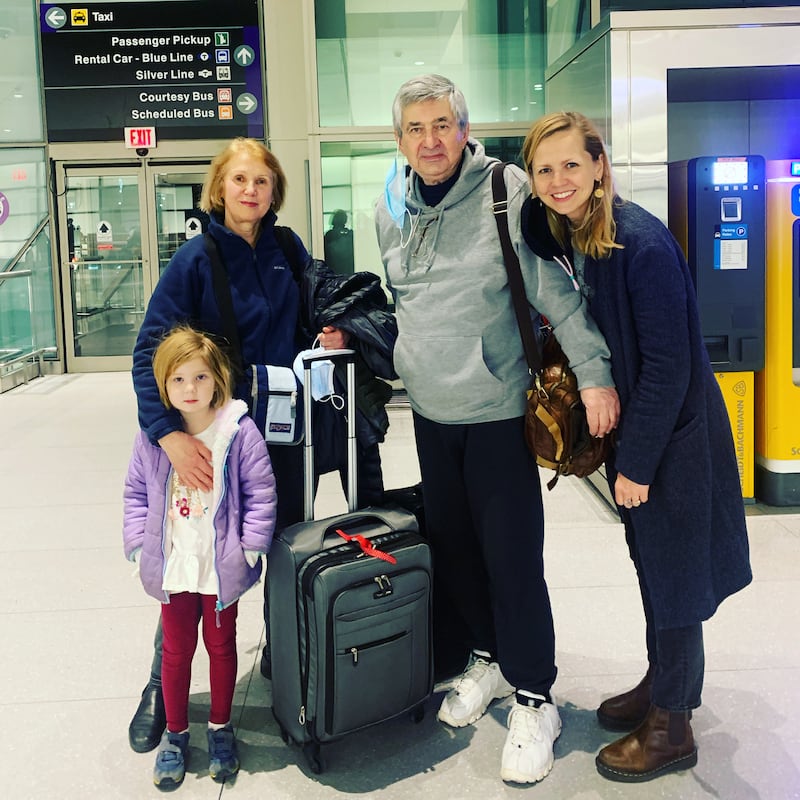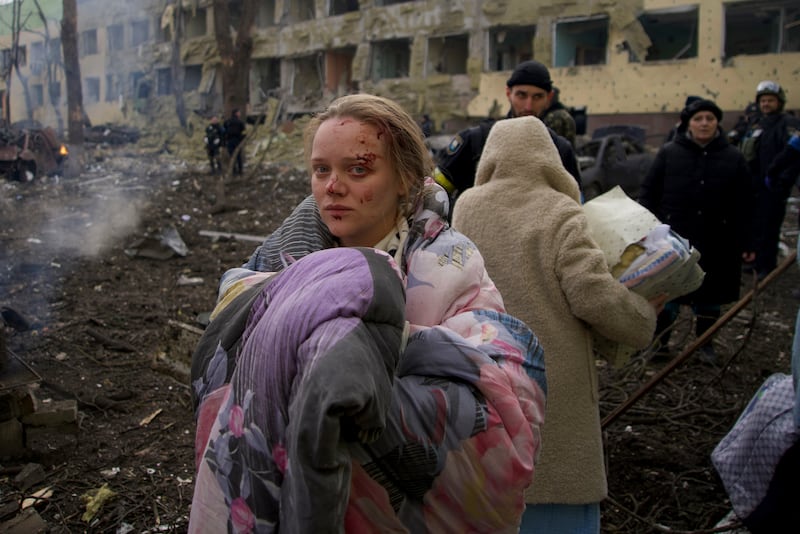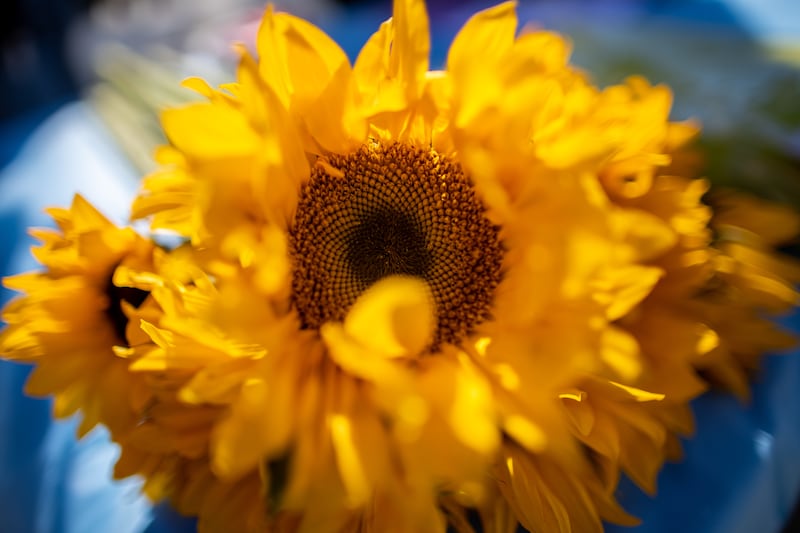My mom, disheveled and dazed, answers my 5:30 a.m. video call on Feb. 24. She’s up unusually early but hasn’t turned on the news yet. “Mama, voyna nachalas,” I say, trying to make sense of the words as I say them. “Mom, the war has started.”
Within minutes of Vladimir Putin’s announcement of the “special military operation” on Ukraine, several explosions thunder across Kyiv. More blasts shake towns in the east, north and south of the country. Their neighborhood is quiet, my mom assures me. Once my dad wakes up, they will discuss what to do.
I insist there isn’t time to discuss: “You need to pack your bags immediately and get out.”
From across the world, in Boston, I’d watched in disbelief the buildup of Russian troops along the Ukrainian border, surrounding Ukraine from all sides. As an invasion looked increasingly likely, I began urging my parents to leave. After all, they had me and their grandkids in the U.S. Their tourist visas were open. But even with the looming prospect of a full-scale war, they had brushed off the need to leave. Like so many others, they didn’t believe Putin would launch a full-scale invasion. The political and economic ramifications for Russia would be abysmal. Besides, my parents had just recovered from COVID-19 and were too frail to travel.
On that first morning of the war, my dad sent a sobering yet calm dispatch. “Hi, dochenka,” he wrote, calling me the diminutive form of “daughter” as he typically did. “Yes, we are under attack. But do not worry, our building is not a strategic target. We’ll hide in the underground garage if needed. We will be staying home.”
For the next few days, I did little else besides monitor my Twitter feed and Telegram channels for updates from the battlefield. Sleep and food, much less my daughter’s fifth birthday, became a distant backdrop to keeping up with the persisting assault of the Russian army on my country. Staring at my screen, I tried to somehow protect my family in Kyiv by refreshing my Twitter feed: “Missile strike expected at 3 p.m,” “Air raid in Kyiv.” Maybe by sharing these horrific updates with my parents, I could warn them of danger and help them escape to the shelter in time. It was a way for me to avoid being utterly useless, I suppose, even though nobody could predict the location of the next attack.
“Are you ready to leave?” became the question I asked my parents daily. “Not yet,” they repeatedly responded, determined to stay in Kyiv through the war. Instead of packing, they stocked up on food and vacuumed their apartment. As retirees, they led a simple life in their sun-filled three-bedroom apartment. They drew meaning from serving in their community of The Church of Jesus Christ of Latter-day Saints. Beloved paintings adorn their walls, lined with bookshelves in rooms filled with my grandmother’s furniture. Their home is a tangible embodiment of their life stories, a place of order and stability. They were no longer the young couple they were in 1986, when after the Chernobyl nuclear disaster my mother carried me, a pudgy 1-year-old, in her arms and fled to Leningrad, Russia, for a few months. Back then, my mother knew she would return, knew the poison would subside and we could go home again.
Now, they sang hymns together and checked in on their fellow Latter-day Saint congregants who remained in Kyiv. Despite the shelling and wailing sirens all around, inside their home, intact for the time being, they felt safer than on the road to a foreign country. If they waited, however, I feared that it may be too late.
While I grew increasingly frustrated with their lack of urgency, I reminded myself that this is not the first time our family and Ukrainians have suffered at the hands of the Russians. In fact, it’s been a constant for our people.

My great-great-grandmother Baba Sasha escaped just in time. Around 1928, she got wind that the Bolsheviks were nearing her village in central Ukraine to confiscate her family’s property, as part of Joseph Stalin’s “dekulakization” effort to create collective farms at the expense of well-to-do peasants.
Baba Sasha and her husband had built out an enviable 1,500-acre farm with a German-made windmill, cattle and cutting-edge agricultural machinery. They had 18 children, though only 12 of them survived. If they resisted the army, the family could be deported to the remote Solovetksy Islands in the White Sea, where a 15th-century monastery had been turned into a prison camp for socialist opponents. Baba Sasha knew she had to act fast. She plopped the youngest of her bunch into a carriage, harnessed the horses and fled westward, leaving everything behind. She made it to Zhytomyr, about a 100 miles from Kyiv, where she ended up raising her family. Her oldest daughter Mariya, who I was named after, along with my grandmother, then a baby, settled in Kyiv.
Throughout Ukraine’s history, Russia has absorbed our land, our people, our myths and our history. By claiming ancestral ownership over Kyivan Rus’, Russia took our founding story and presented it as their own. Through the “Russification” campaigns in the Russian Empire, they banned the Ukrainian language, and jailed and exiled writers and activists who dared to speak freely about Ukrainian national identity. By starving Ukrainian peasants during Holodomor in the early 1930s, the Soviets intended to erase Ukrainian culture and thwart the Ukrainian spirit. But it never worked. Each act of oppression at the hands of Russian imperialism only strengthened the resolve of the Ukrainian people to fight for their freedom.
Growing up in Kyiv in the 1990s, our school textbooks reclaimed the history of the newly independent Ukraine as a people with its own rich history and a vision of the future. We learned about the fierce Cossack warriors and memorized the poems by the bard Taras Shevchenko and Lesya Ukrainka, a pioneer of Ukrainian feminism. In the time of burgeoning Ukrainian consciousness, those poems instilled in me the first inkling of what it meant to be a Ukrainian.
Now, like a white cocoon, sandbags wrap around the statue of Shevchenko in Kharkiv, Ukraine’s Soviet Republic’s first capital, to protect against Russian invaders who are raging an unprovoked and barbaric war of destruction across peaceful Ukrainian cities. Under the pretext of liberating Ukrainian people from Nazis, Putin has set out to subjugate Ukraine, and if that fails — destroy it.
I left Ukraine almost 20 years ago to attend Brigham Young University, but with more time away, the parts of my Ukrainian life and culture — that at times felt trite and commonplace growing up — acquired a newfound depth and beauty. The embroidered blouse vyshyvanka, the patriotic poems, the yellow and blue stripes of the Ukrainian flag — these symbols anchored me to my Ukrainian identity and reminded me of who I was. So I clung to them fervently. When my American husband and I were planning our wedding, we settled on a traditional Ukrainian wedding at a re-created cossack village in Kyiv.
“These symbols anchored me to my Ukrainian identity and reminded me of who I was. So I clung to them fervently. ”
Since the beginning of the Russian invasion, these symbols are now everywhere: Ukrainian flags popped up in windows across Boston. The national anthem “Ukraine has not yet perished” resounds at the rallies. These symbols mean something to outsiders, too —outward signs of allegiance and a hopeful reminder that the world cares.
Each day after Feb. 24, the attacks on Ukraine grew more sickening, devoid of dignity and humanity. Russian missiles pummeled Kharkiv, turning monuments, historical and residential buildings into rubble. Life descended into the underground — metro stations and bomb shelters with children and adults huddling, crying, singing together. In Kyiv, a Russian missile struck a high-rise residential building, much like one where my parents live, leaving a gray void with ceilings and balconies hanging without support. The invaders surrounded Mariupol, cutting Ukrainian residents off from food, water and electricity. The deaths of peaceful residents — mothers and children — mounted.
Amid the exodus of 4 million Ukrainians toward neighboring borders, I think of how inadequately the word “evacuate” describes the unimaginable choice of leaving your home, possibly for good. The term presumes a removal, an emptying from a space toward safety. But war forces on people a different kind of emptying: their homes left behind remain full of belongings, while inside, those who escape feel hollow. For my parents, too, the decision to leave becomes an agonizing process of weighing the risks of staying and dangers of leaving — the shelling or robbery they could encounter en route.
No option presents guarantees for survival.
As Kyiv fortifies its defenses, eerie and desolate, my hometown comes alive in my memory more vividly than ever before. In grade school, my classmates and I played detectives in our school courtyard in the center, imagining that wooden garage doors contained mysteries to be solved. In high school, my best friend Liliya and I strolled up and down Khreshchatyk —Kyiv’s main street — for hours, eating cheap hot dogs and ice cream cones. Now, steel “hedgehogs,” spider-like obstacles made of I-beams, block the sprawling streets in the center to defend the city against Russian tanks. Liliya is in America now, too, and we are constantly on the phone, devising a plan to get our families out of danger.
“They’re packing, thank goodness,” Liliya updates me, relieved that her efforts to convince her family to leave proved to be effective. I wonder if I’m not making my case strongly enough. “I’m begging you, leave. If not for yourself, do it for us,” I write to my parents one morning.
The Russian attacks inch closer to places dear to me. A missile destroys the facade of the Lukyanivska metro station, located in a neighborhood where I spent most of my childhood and early teenage years. A projectile blows out the windows in an apartment building where my parents brought me as a newborn, where my grandmother lived, and where I first introduced my husband to Ukrainian TV programs as part of his crash course in Ukrainian culture. Everything about this destruction and violence feels personal. Putin is waging a war not only on the Ukrainian land, but also on the individual and collective identity of Ukrainians.
“We’re leaving in the morning,” my parents write on Day 7 of the war. After reading those words, I exhale, a wave of peace descending on me. They make plans to drive westward with my mother’s brother-in-law, whose family left earlier to a small western town in the Carpathian Mountains.
That night I allow my body to collapse from the grief and exhaustion I’d grown numb to since the invasion began.

Their drive out of Kyiv, interrupted by dozens of checkpoints, takes three times as long as it would have in pre-war times. I try booking them a hotel to spend the night, but all hotels are completely full. Luckily, tragedies tend to bring the right people out of the woodwork — a relative I didn’t even know we had takes them in for the night. On the fourth day of their journey, they finally reach the Polish border. There, Latter-day Saint volunteers, as if by muscle memory, join forces to help incoming refugees with food, lodging and rides.
When I hear from my mom in the middle of the night, her voice quivers: “I crossed the border, but dad hasn’t yet,” she says. My heart sinks. Several hours later, she sees him approaching along with dozens of other elderly men, who were delayed by border guards for more scrupulous passport checks. Once reunited, they paused to recuperate in a heated tent before a volunteer drove them to the Warsaw airport. “They had the best sausages at the border,” my parents reported.
The day before they land in Boston, a Russian airstrike hits the maternity hospital in Mariupol. For days after, I can’t stop thinking about the eyes of Mariana Vishegirskaya, a Mariupol mother who stood amid the rubble of the hospital, wrapped in a pastel-colored comforter. She looked right into the camera, her eyes filled with grief, contempt and numbness. I read that after she delivered her baby, she was moved to another location, which also was hit by another strike. It’s as if the Russians were determined at all costs to prevent her from giving life. Mariana and her baby Veronika survived, but another mother from the hospital died days later.

I find myself reckoning with a stomach-churning realization that I belong to a people that another nation has always seen as inferior — as less human. That Ukrainians’ suffering is a consequence of being themselves. As the Russian troops withdrew from Bucha, harrowing images painted a picture of the devastation they left behind: mass graves, bodies of executed civilians — many of them children and entire families — tortured and discarded as if they were never deemed worthy of life. The Russian soldiers took civilians’ lives, then they took their electronics, clothing and jewelry. Bloodstain-covered gold earrings that were ripped off and stolen.
Lately — flashing across my mind between disturbing clips and the constant stress of a radically new daily life — I can’t stop thinking about another ancestor, my great-grandfather Andriy. With a starving wife and three children at home, he would trudge out to the field near their village in the Poltava region to scavenge for something for them to eat: potatoes, carrots, beets, anything. In 1932, by manufacturing a human-made famine, Stalin hoped to eradicate independent-minded Ukrainians and continue collectivization efforts that several years earlier forced Baba Sasha to flee her home. Andriy must have been thin as a wheat shaft, so hopelessly desperate as he stooped for signs of green along the ground. But he was Ukrainian. He loved his family, and he would fight until the bitter end.
One day, my great-grandfather didn’t return.
The story in the family goes that he collapsed in the field from hunger, becoming one of 4 million, perhaps more, Ukrainians who died in the famine.
What haunts me most about Andriy’s story is that death reached him at the moment when he wanted to live most, when his family’s survival depended on his safe return. Many Ukrainians in Mariupol, Kharkiv, Bucha, Kherson and so many other towns have not come home after venturing above ground to find food, find their family member, or risk the escape toward safety. These stories of people determined to live brought the history of my family — and the Ukrainian people — into sharper focus, voices across generations echoing in the fight and yearning for freedom.
“The unspeakable tragedies that mark Ukraine’s history are also the stories of Ukrainians daring to hope even when hope appeared to have vanished.”
I began to discover a profound sense of ancestral connection that seemed previously dormant, not only to my family, but to all Ukrainians who preceded me. The unspeakable tragedies that mark Ukraine’s history are also the stories of Ukrainians daring to hope even when hope appeared to have vanished. As the world watches in horror, the Ukrainian people defend their land through tears and heartache, revealing a courage and fortitude no one knew was possible.
Our small apartment in Boston is now like the mitten from a beloved Ukrainian fairy tale that magically expands to make room for every animal seeking refuge from the cold. There are seven of us, both adults and kids, relearning the concept of sharing all over again. My 9-year-old son reluctantly sleeps in a room with his two younger sisters. Adapting to each other’s routines and preferences has pushed us beyond our thresholds of comfort.
Although there is no program for the newly arrived Ukrainian refugees in the U.S., our local and church communities welcomed my family with generosity: people have donated meals, money, clothing; left bouquets of sunflowers on our doorstep.
But what helps my parents most is feeling useful. My mom assists with cleaning, laundry and cooking. I translate Hello Fresh recipe instructions for her. My dad drives my kids to and from school. Being helpful gives them a purpose — something to do while, estranged from their home, as they wait for Ukraine’s victory. But the longing to return home is ever-present, surfacing both in the big things and small. My mom grieves the loss of life and the scattering of loved ones. But she’s also worried about her plants that have been unwatered for over a month, the eggs that got left behind in the fridge. Every day is sustained by the hope that, unlike Baba Sasha and Grandpa Andriy, they will return.



